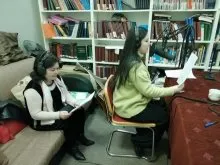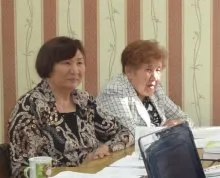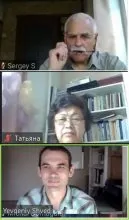newsletter-01062022

Karachay Bible translator Lyudmila came to the IBT Moscow office from the village of Kyzyl-Pokun in the Karachay-Cherkessia region of the North Caucasus in order to audio record her first translated Bible portion – the book of Jonah. Her younger daughter Farida, who lives in Moscow, read the translation aloud while Lyudmila listened and made suggestions for improving the reading. At the end of their two day working session, I asked the translator to share how she joined the Bible translation project.
“I grew up in the Soviet era, when our Muslim people didn’t particularly flaunt their commitment to traditional religion. Nevertheless, Muslim rituals were present in my childhood in one way or another, and two things always struck me about them: the need to repeat prayers in Arabic without understanding their meaning, and the tradition of standing up respectfully when pronouncing the name of the Prophet Muhammad, even though there was no similar custom to do the same when pronouncing the name of Allah Himself. One more thing I was curious about as a child: what is this mysterious word Amen that is used at the end of Muslim rituals (as well as at the end of Christian prayers)?
newsletter-020322

newsletter-060122

The contemporary Khakas people are descendants of the Yenisei Kyrgyz, who ruled Khakassia in the 7th century A.D. and were later conquered by Mongolian tribes. Today’s Khakas are neither Muslim, like the Kyrgyz of Central Asia, not Buddhist, like their neighbouring Tuvans, who were also dominated by Mongolia for part of their history...
newsletter-050921

“Whatver a human being can produce is never perfect. Even if you are highly professional in what you do, there is always the chance that time and a new perspective will show you what could be improved. Moreover, language and culture are never static, so translation too needs to keep up with ongoing developments. As the ancient Greeks used to say, πάντα ρεῖ – ‘everything flows’ – including language and culture. And we as Bible translators need to accept this and adapt to it. Many Bible scholars believe that ideally every generation should have its own Bible translation.”
newsletter-010621

newsletter--010321

articles-22122020
As I looked through the Tabasaran-Russian dictionary developed by Selina (a pseudonym), a Tabasaran linguist, a thought flashed through mind: “It must feel odd you to pray to God in Russian, where the word ad ‘hell’ sounds the same as the word ad ‘glory’ in your mother tongue.” Selina is the field-tester and local co-ordinator in IBT’s Tabasaran Bible translation project, and I also knew that she is a Christian believer. However, when I voiced my guess that she probably uses Tabasaran, and not Russian, in her church, she laughed merrily at my total ignorance. “Do you really think that there are so many Christians among my people that we could have opened a Tabasaran church?” she shrugged. “There are just two Christians on our translation team: the translator and myself. The rest of the team members are Muslims, as are the absolute majority of Tabasarans. Of course we have to attend a Russian-language church.”
newsletter-080920

Here is Mal 2:2 in the Revised Standard Version: “If you will not listen, if you will not lay it to heart to give glory to my name, says the Lord of hosts, then I will send the curse upon you and I will curse your blessings; indeed I have already cursed them, because you do not lay it to heart.” What is a “blessing”? And a “curse”? When using these words today...
newsletter-010620

newsletter-020320



